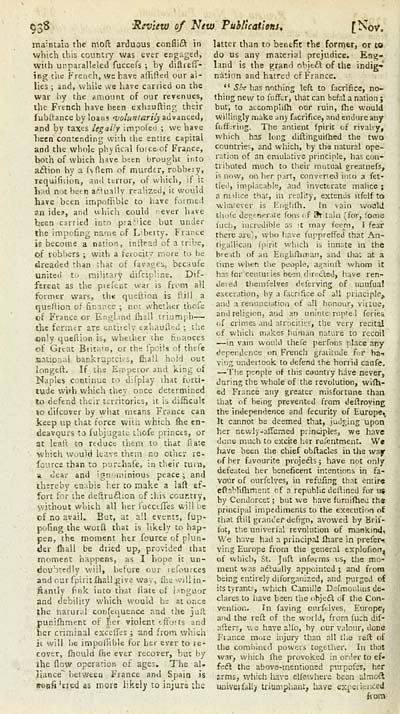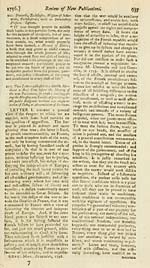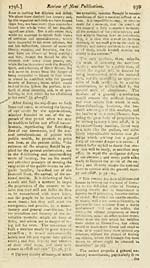Download files
Complete book:
Individual page:
Thumbnail gallery: Grid view | List view

938
Review of New Publtcatlons,
[Nov.
maintain the trlofl; arduous conflift in
which this country was ever engaged,
with unparalleled fuccefs ; by diftreff-
ing the French, we have aflified our al-
lies ; and, while vve have carried on the
war by the ? mount of our revenues,
the French have been exhaufting their
lubliance by loans 'volufi/arilyidvunced,
and ^v taxes legally impofed ; we have
"been contending with the entire capital
and the whole phyfical force of France,
both of which have been Ijrought into
aftion by a (vfiem of murder, robbciy,
requifuion, and ttrror, of whicli, if it
had not been ar^ually realized, it would
have been iinpoffible to have formed
an ides, and which could never have
been carried into praMice but under
the impofing name of Liberty. France
is become a nation, inllead of a tribe,
of robbers ; with a feiocity more to t)e
dreaded than that of favapes, becaufc
united to military difcipline. Dif-
ferent as the piefent war is from all
former wars, the queftion is Itill a
quelVion of finance ; not A'hether thole
of France or Enj^l.md IhsU triumph —
the former are entiielv exhauilcd ; the
only queftion is, whether ihe finances
of Great Biitain, or the rpoils of thefe
aatipnal bankruptcies, Ihall hold out
longeft. If the Emperor and king of
Naples continue to difplay that forti-
tude with which they once determined
to defend their territories, it is difficult
to difcover by what means France can
keep up that force witli which flie en-
deavours to fubjugatu thofe princes, or
at leaft to reduce them to that Pi ate
which would Itav-i them no other re-
foiirce than to purchaie, in their turn,
u Jear and ignominious peace ; and
thereby enable her to make a iaft ef-
fort for the deftruflion of :liis country,
v;ithout wiiich all her fucctlTes will be
cf no avail. But, at all events, fup-
pofing the word that is likely to hap-
pen, the moment her fource of plun-
der Ihall be dried up, provided that
moment happens, as I hope it un-
doubtedly will, before our lefources
and our fpiritlhall give wav, flic ^viUin-
ftantly fmk into that fiate of languor
and debility which would be at once
the natural confequence and the juft
punilhment of lier violent tftoits and
her criminal cxceires ; and from which
it will be impolTible for her ever to re-
cover, fhould (he ever recover, but by
the flow operation of ages. The al-
liance" between France and Spain is
«««fi'tred as more likely to injure ;he
latter than to benefit the former, or to
do us any material prejudice. Eng-
land is the grand objeft of the indig-
nation and hatred of France.
" Shi has nothing left to facrifice, no-
thing new to fuffcr, that can befnl a nation ;
but, to accomplifh oar ruin, fhe would
willingly ntiake any facrifice, and endure any
fiifFiriiig. The antieut fpirit of rivalry,
which has long diftinguifhed the two
countries, and which, by tha natural ope-
ration of an emulative principle, has con-
tributed much to their mutual greatnefs,
is now, on lier part, convened iiiio a fet-
tled, impiac:ible, and inveterate mahce ;
a mdice that, iu reality, extends itfelf to
whatever is linglifh. In vain v/oald
thofe degenerate fons (if Utitaiu (for, feme
fuel), iutrtidihle as it may feem, 1 fear
there arc), who have fupprelTed that An-
tigallicau fpirit which is iun.-te in the
breath of an Englifhnnan, and ilia: at a
time when tlie people, againfl whom it
has for centuries be-sn diredlej, have ren-
deied themfelves deferving of unufual
execration, by a facrifice of all principle,
and a renunciation of all honour, virtue,
and religion, and an unintcirupte.l feriea
of crimes and arrocitief, the very recital
of which makes human nature to recoil
-—in vain would thefe perfons place any
dependence on French gratitude fur ha^
ving undertook to defend the horrid caufe.
— The people of this cuuntry h;\ve never,
daring the whole of the revolution, wifh-
ed France any greater m.isfortune than
that of being prevented from deftroying
the independence and fecurity of Europe^
It cannot be deemed that, judging upon
her newly-alTumed principles, we have
done much to excite lisr refentment. We
have been the chief obftaclcs in the way
of her favourite proje^ls ; have not only
defeated her beneficent intentions in fa-
vour of ourfelves, in refufmg that entire
eOablifhmsnt of a republic dcttined for us
by Condorcer ; but we have furnifheu the
principal impediments to the execution of
that ftill grani!erdefign, avowed by Brif-
fot, the univerfal revolution of mankind.
We have had a principal Ihare in prefer-
ving Europe from the general cxploflOn^
of which, St. Jnfl infarms us, the mo-
ment was adlually appointed ; and from
being entirely diforganized, and purg&.l of
its tyrantf, which Camille Dsfmoulins de-
clares to have been the objeft of the Con-
vention. In faving curftlves, Europe,
and the reft of the world, from fuch dif-
afters, v. e have alfo, by our valour, done
France more injury than all the reft o£
the combined powers together. In that
war, which Ihe provoked in order to ef-
fcft the above-mentioned purpofcs, her
arms, which liave elfewhere been almcft
univeifall> triumpliant, have expeiierxed
from
Review of New Publtcatlons,
[Nov.
maintain the trlofl; arduous conflift in
which this country was ever engaged,
with unparalleled fuccefs ; by diftreff-
ing the French, we have aflified our al-
lies ; and, while vve have carried on the
war by the ? mount of our revenues,
the French have been exhaufting their
lubliance by loans 'volufi/arilyidvunced,
and ^v taxes legally impofed ; we have
"been contending with the entire capital
and the whole phyfical force of France,
both of which have been Ijrought into
aftion by a (vfiem of murder, robbciy,
requifuion, and ttrror, of whicli, if it
had not been ar^ually realized, it would
have been iinpoffible to have formed
an ides, and which could never have
been carried into praMice but under
the impofing name of Liberty. France
is become a nation, inllead of a tribe,
of robbers ; with a feiocity more to t)e
dreaded than that of favapes, becaufc
united to military difcipline. Dif-
ferent as the piefent war is from all
former wars, the queftion is Itill a
quelVion of finance ; not A'hether thole
of France or Enj^l.md IhsU triumph —
the former are entiielv exhauilcd ; the
only queftion is, whether ihe finances
of Great Biitain, or the rpoils of thefe
aatipnal bankruptcies, Ihall hold out
longeft. If the Emperor and king of
Naples continue to difplay that forti-
tude with which they once determined
to defend their territories, it is difficult
to difcover by what means France can
keep up that force witli which flie en-
deavours to fubjugatu thofe princes, or
at leaft to reduce them to that Pi ate
which would Itav-i them no other re-
foiirce than to purchaie, in their turn,
u Jear and ignominious peace ; and
thereby enable her to make a iaft ef-
fort for the deftruflion of :liis country,
v;ithout wiiich all her fucctlTes will be
cf no avail. But, at all events, fup-
pofing the word that is likely to hap-
pen, the moment her fource of plun-
der Ihall be dried up, provided that
moment happens, as I hope it un-
doubtedly will, before our lefources
and our fpiritlhall give wav, flic ^viUin-
ftantly fmk into that fiate of languor
and debility which would be at once
the natural confequence and the juft
punilhment of lier violent tftoits and
her criminal cxceires ; and from which
it will be impolTible for her ever to re-
cover, fhould (he ever recover, but by
the flow operation of ages. The al-
liance" between France and Spain is
«««fi'tred as more likely to injure ;he
latter than to benefit the former, or to
do us any material prejudice. Eng-
land is the grand objeft of the indig-
nation and hatred of France.
" Shi has nothing left to facrifice, no-
thing new to fuffcr, that can befnl a nation ;
but, to accomplifh oar ruin, fhe would
willingly ntiake any facrifice, and endure any
fiifFiriiig. The antieut fpirit of rivalry,
which has long diftinguifhed the two
countries, and which, by tha natural ope-
ration of an emulative principle, has con-
tributed much to their mutual greatnefs,
is now, on lier part, convened iiiio a fet-
tled, impiac:ible, and inveterate mahce ;
a mdice that, iu reality, extends itfelf to
whatever is linglifh. In vain v/oald
thofe degenerate fons (if Utitaiu (for, feme
fuel), iutrtidihle as it may feem, 1 fear
there arc), who have fupprelTed that An-
tigallicau fpirit which is iun.-te in the
breath of an Englifhnnan, and ilia: at a
time when tlie people, againfl whom it
has for centuries be-sn diredlej, have ren-
deied themfelves deferving of unufual
execration, by a facrifice of all principle,
and a renunciation of all honour, virtue,
and religion, and an unintcirupte.l feriea
of crimes and arrocitief, the very recital
of which makes human nature to recoil
-—in vain would thefe perfons place any
dependence on French gratitude fur ha^
ving undertook to defend the horrid caufe.
— The people of this cuuntry h;\ve never,
daring the whole of the revolution, wifh-
ed France any greater m.isfortune than
that of being prevented from deftroying
the independence and fecurity of Europe^
It cannot be deemed that, judging upon
her newly-alTumed principles, we have
done much to excite lisr refentment. We
have been the chief obftaclcs in the way
of her favourite proje^ls ; have not only
defeated her beneficent intentions in fa-
vour of ourfelves, in refufmg that entire
eOablifhmsnt of a republic dcttined for us
by Condorcer ; but we have furnifheu the
principal impediments to the execution of
that ftill grani!erdefign, avowed by Brif-
fot, the univerfal revolution of mankind.
We have had a principal Ihare in prefer-
ving Europe from the general cxploflOn^
of which, St. Jnfl infarms us, the mo-
ment was adlually appointed ; and from
being entirely diforganized, and purg&.l of
its tyrantf, which Camille Dsfmoulins de-
clares to have been the objeft of the Con-
vention. In faving curftlves, Europe,
and the reft of the world, from fuch dif-
afters, v. e have alfo, by our valour, done
France more injury than all the reft o£
the combined powers together. In that
war, which Ihe provoked in order to ef-
fcft the above-mentioned purpofcs, her
arms, which liave elfewhere been almcft
univeifall> triumpliant, have expeiierxed
from
Set display mode to: Large image | Transcription
Images and transcriptions on this page, including medium image downloads, may be used under the Creative Commons Attribution 4.0 International Licence unless otherwise stated. ![]()
| Early Gaelic Book Collections > Ossian Collection > Gentleman's magazine, and historical chronicle > Volume 66, Part 2 > (422) |
|---|
| Permanent URL | https://digital.nls.uk/79426835 |
|---|
| Description | Selected books from the Ossian Collection of 327 volumes, originally assembled by J. Norman Methven of Perth. Different editions and translations of James MacPherson's epic poem 'Ossian', some with a map of the 'Kingdom of Connor'. Also secondary material relating to Ossianic poetry and the Ossian controversy. |
|---|
| Description | Selected items from five 'Special and Named Printed Collections'. Includes books in Gaelic and other Celtic languages, works about the Gaels, their languages, literature, culture and history. |
|---|

